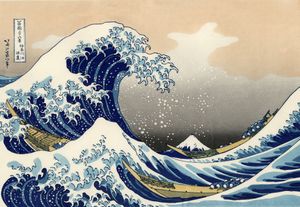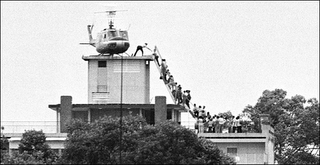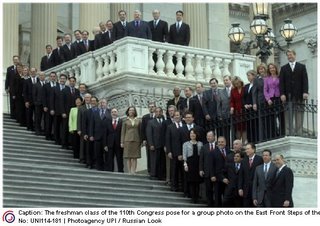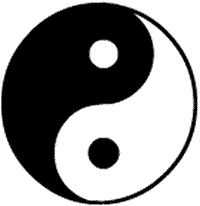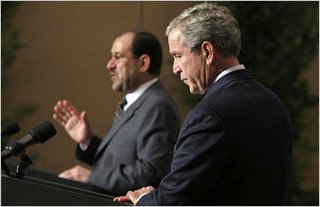Two CoastsTo watch
the sun rise
over the Atlantic
Ocean, and
that same
day, set
over the Pacific
Ocean: something
of a marvel,
no? Who
of all humans
who ever
lived, but we,
this past
century, and less,
have seen
this miracle?
And a Final Thought ot Two...... inspired by Art Basel/Miami. Aside from the fairs we have talked about, Bush, it was the number of private collections open to the public and the concurrent museum shows that made decisions about what to see—and what to miss—that much more difficult. I already mentioned the Rubell collection and its exhibition of Los Angeles artists, which we saw on our first day in Miami. Regrettably, we missed the show of Bruce Nauman’s neon works at the Museum of Contemporary Art, which proved too far to get to easily, especially given so short a stay. We also missed the Bass Museum—close to the Convention Center, but, well… we simply lacked the time.
I was happy, though, that we did make time to cross over to downtown Miami to catch two exhibitions of selections from the Ella Fontanals-Cisneros Collection. “The Sites of Latin American Abstraction” was a useful history of the manifestations of geometric abstraction in Latin America. My own preference is for the more “hand-made” works in this genre rather than those architectural, sometimes mechanical forms that strike me as rather cold and intellectual. I do love monochrome painting and even the simplest of geometric surfaces where I detect the obsessive striving for perfection of the human mind. There were enough examples of this kind of work included to make this show appealing to the soulful part, as well as stimulating to the brain cells.
Still more fascinating, for me, was the rather clumsily entitled “Forms of Classification: Alternative Knowledge and Contemporary Art.” This headline led me to expect something drearily academic, but the title proved misleading. I’m sure that the curator’s statement of intention was also intended to illuminate, but I found that it unnecessarily obfuscated what was a truly wonderful exhibition—by turns deeply moving, intellectually challenging, and at times just laugh-out-loud funny. “Conceptual art” can all too often be a bore, especially, for me, when I can easily “get it” and move on. The works in this show, for the most part, were rich, engaging to the eye and mind, and inexhaustible in meaning and association.
Take, for example, the work that occupied the entire first room of the exhibition, an installation by the artist Susan Hiller: a wall text, a whole wall of small, framed photographs and an accompanying book documented Hiller’s journey throughout contemporary Germany in search of streets whose names included references to Jews: Judenstrasse, Kleine Judengasse… innumerable variations which poignantly evoked the past history and contribution of a once-vital part of the population to German society and German culture, as well as the memory of their ubiquitous presence in these towns and villages and cities, and the tragedy of their loss in the Holocaust. And, too, a kind of ghost-like, haunting presence evoked simply by the remaining street names and the signs that identify them.
Or take the work of Mathilde ter Heijne, whose long racks of stark, black and white postcard images of unknown women of the nineteenth century brought all cultures together—African, Indian, Western-Caucasian, East Asian—in an equally poignant recollection of the vulnerability and the anonymous, transitory nature of human, in this case particularly feminine existence. Invited to take an image from the racks, I found myself involved in a complex contemplation of the possible reasons for making my own selection: beauty or pathos, strength, seeming intelligence or compassion… and exploring the social implications of those choices; and fascinated by the choices that others had made before me, how some racks were almost depleted of their images, while others remained untouched, neglected, waiting for recognition or attention. The piece seemed to me a new, less strident, more reflective feminism, an invitation to think with depth and penetration about how each of us individually views women and their place in the world.
Or the work of Francis Alys, the videotaped night-time adventures of a fox let loose in the deserted halls of the British National Portrait Gallery, assembled, I assume, from the tapes of surveillance cameras. It’s amusing, of course, to watch the creature’s restless travels over the polished parquet floors and, on occasion, over the stuffed leather benches, between the serried rows of masterpiece human portraits from all ages; but its also a study in the contrasting worlds of art and nature, an evocation of the old ars longa, vita breva (do I have my Latin right this time) conundrum, the swift vitality of the constantly moving fox and the stuffy, lifeless things hung on the walls. Lots to think about there, and an engaging visual treat—one that never bores or tires the eye.
More hilarious still, and equally compelling from the viewer-auditor’s point of view is the installation Julian Rosenfeldt, whose videotapes and sound equipment record the details of his every smallest movement in a deadpan reenactment of life’s daily activities: eating, walking, scratching, crumpling paper, rolling a cigarette and lighting up, placing things on the surface of a table, all in high definition sound and image… Three large, wall-sized screens record the action from three different angles, focussing sharpened attention on the most ordinary of sounds and movements and challenging us, it seemed to me, into surprised and delighted awareness of the inherent interest of each passing moment in time.
Joseph Grigely’s wall of simple paper notes also draws on the most ordinary aspects of the daily experience of being human. Colorful recycled post-its, sheets from memo pads, folded napkins, scraps of torn paper of all kinds are pinned up edge to edge to form and fill a perfect rectangle, a geometric not-painting flush against the wall inviting the viewer to contemplate the passing thoughts and feelings of scores of anonymous—and probably unwitting—contributors whose scribbled notes have been assembled here. Polite or acerbic, passionate or simply business-like, these throwaway texts form a fascinating pattern of interrupted, essentially temporal human-to-human (or self-to-self!) communications, spontaneous in their original intention but transformed into a kind of gently ironic timeless status by their inclusion in the artwork. We are asked to reflect on the relationship between the public and the private, the relativity of meaning and ephemeral intentions…
And then there are Allan McCollum’s surrogate paintings, lines of small black monochromes which mock the art of painting, the viewer, and themselves; Jimmie Durham’s videotape in which the artist is seen simply smashing whatever happens to be brought to him by willing participants, and handing them a signed certificate in exchange; and Monika Weiss’s moving work about books, their physical properties and their intellectual content… and the tyrannical act of burning them.
And more, too much to mention here. I found myself engaged throughout, constantly shifting in intellectual position and emotional response. The “up” side of the Miami experience remains the reassurance that our artists will continue to surprise and challenge us with their investigations into the unknown and the unknowable, and their inventive forays into the infinite possibilities of creative media.
Back home in California, I gather that you, too, Bush, are exploring infinite possibilities. None of them good. I have some catching up to do before we talk again. In the meantime, forgive these long digressions.










